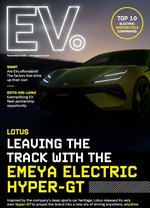The electric vehicle transition is governed by information

It’s no surprise that when both consumers and businesses consider switching their internal combustion engine (ICE) vehicles for electric counterparts that the cost is a major factor driving their decisions. Peeling away from a century of fossil-fuel-burning vehicles is no mean feat, as can also be seen in areas like technology where digital transformation is still unfolding today.
The idea of change is what allows businesses to come to the fore and reduce their impacts on the planet, but do the benefits outweigh the risks? The Sustainability LIVE conference at the Business Design Centre, London, played host to some professionals in the industry with truly applied examples of how electrification can impact everyone, but also enable a number of commercial benefits if considered correctly.
One of the key themes of this topic was cost, but with two references—the monetary cost to the owner and the physical cost to the planet. With that said, the Sustainable Transport Forum covered EVs and mobility as a general trend, which is influenced by the sheer diversity of requirements of businesses and their fleets.
As explained early in the panel discussion by Martin Kochman, VP, Customers and Industries at Hitachi, EVs are “clearly part of the jigsaw and it also depends what targets we’re talking about. In terms of where we will meet certain targets, EVs play a role. In metropolitan areas, I’m sure EVs will be a significant force. Perhaps outside of metropolitan areas, less so.”
Information is the key to a better relationship with EVs
This is where information is vital to helping businesses understand the facts about EVs. In order to help more organisations adopt electrified cars for their fleets—or in some cases, other alternative transport solutions—they must first understand that there is no single measure of cost that can determine their sentiments towards owning them.
To put this simply Sam Clarke, Chief Vehicle Officer at GRIDSERVE, says that the idea of using electric cars, vans or trucks must be put into perspective before organisations can turn their heads away from them.
“Vehicle costs are coming down,” says Clarke. “The total cost of ownership is very important. So, we can make people aware of the fact that capital costs of the vehicles might be higher, but the running cost is so much lower. You club those two things together and you’ll find that electric vehicles are cheaper to run than the petrol or diesel equivalents.”
This point is further explained as Kochman reiterates some of the differences between business locations, frequent routes, and overall operations with reference to low impact zones.
“If you drive an EV in a congestion-charge zone, it’s about 10% cheaper than a conventional vehicle versus driving one outside where it’s actually 4% more expensive than driving a conventional vehicle.”
What we can gain from these points reverts back to the key idea of perspective. What these executives are saying is that there are a number of things to be considered before making the switch. This can be as broad as the budget for each vehicle to more granular details like the selected charging tariffs and how private charging integrates with the site on which it is installed.
From the perspective of another panellist, Peter Gallagher, Commercial Director of Extreme E: “There needs to be more focus on cost in terms of manufacturing. We talk about cars and public transport, but also mining and the infrastructure of construction is quite key as well.”
This point focuses more on information from different industries and what is physically achievable for them, which ties into the idea of perspective. Understanding the constraints and demands of organisations in the supply chain makes a huge impact on people’s opinions of EVs as the scapegoats for ‘EV bashing’. By recognising the supply chain issues and the need for further innovation to mine more lithium, generate more materials, and bring down the costs behind the scenes, consumers and businesses may become more understanding of the challenges in building low-cost EVs.
“From the supply side, there’s a shortage of lithium, and there’s a shortage of platinum. I think governments should work together a bit closer to make sure that manufacturing still sticks and enable people to actually buy them at a market rate.”
Infrastructure is everything in sustainable transformation
With attention firmly on EV adoption now that the industry is rapidly evolving, a much larger spotlight is cast on the infrastructure required to power a full network of electrified vehicles on the roads in years to come.
As explained by the panel, much of the problem is a result of accessibility. While many drivers may notice a lack of charging stations in a specific area, the potential for blame on the energy sector and its output is somewhat inevitable. However, both Kochman and Clarke stress that sustainable energy capacity is available in the UK, but the ability to distribute it to new charging sites is the challenge that companies face.
This point arose as conversation about government input occurred with the panellists explaining how authorities and their legislation could be the key to enabling more sustainable opportunities in some areas of the industry. One example being localised sites to deliver independent energy.
“You put in the application to the local energy distribution company, and you join the queue, then ‘see you in five years’ if you’re lucky,” says Kochman.
He continues to explain the thought of some independent retail sites with land available to build sustainable energy systems on, which again become hindered by legislative roadblocks.
“You run into endless regulations and constraints again even though you’re practically doing the whole thing yourself this time.”


